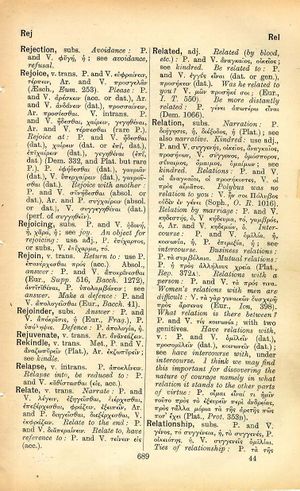relation: Difference between revisions
Ἀναξαγόρας δύο ἔλεγε διδασκαλίας εἶναι θανάτου, τόν τε πρὸ τοῦ γενέσθαι χρόνον καὶ τὸν ὕπνον → Anaxagoras used to say that we have two teachers for death: the time before we were born and sleep | Anaxagoras said that there are two rehearsals for death: the time before being born and sleep
m (Text replacement - "<b class="b2">Ion</b>" to "''Ion''") |
mNo edit summary |
||
| Line 1: | Line 1: | ||
{{Woodhouse1 | {{Woodhouse1 | ||
|Text=[[File:woodhouse_689.jpg|thumb|link={{filepath:woodhouse_689.jpg}}]]'''subs.''' | |Text=[[File:woodhouse_689.jpg|thumb|link={{filepath:woodhouse_689.jpg}}]]'''subs.''' | ||
[[narration]]: P. [[διήγησις]], ἡ, [[διέξοδος]], ἡ (Plat.); see also [[narrative]]. | |||
[[kindred]]: use adj., P. and V. [[συγγενής]], [[οἰκεῖος]], [[ἀναγκαῖος]], [[προσήκων]], V. [[σύγγονος]], [[ὁμόσπορος]], [[σύναιμος]], [[ὅμαιμος]], [[ὁμαίμων]]; see [[kindred]]. | |||
[[relations]]: P. and V. οἱ [[ἀναγκαῖοι]], οἱ [[προσήκοντες]], V. οἱ πρὸς αἵματος. | |||
[[Polybus was no relation to you]]: V. ἦν σοι [[Πόλυβος]] οὐδὲν ἐν γένει (Soph., ''O.R.'' 1016). | |||
[[relation by marriage]]: P. and V. [[κηδεστής]], ὁ, V. [[κήδευμα]], τό, [[γαμβρός]], ὁ, Ar. and V. [[κηδεμών]], ὁ. | |||
[[intercourse]]: P. and V. [[ὁμιλία]], ἡ, [[κοινωνία]], ἡ, P. [[ἐπιμιξία]], ἡ; see [[intercourse]]. | |||
[[business relations]]: P. τὰ [[συμβόλαια]]. | |||
[[mutual relations]]: P, ἡ πρὸς ἀλλήλους [[χρεία]] (Plat., ''Rep.'' 372A). | |||
[[relations with a person]]: P. and V. τὰ [[πρός]] τινα. | |||
[[women's relations with men are difficult]]: V. τὰ γὰρ γυναικῶν δυσχερῆ πρὸς ἄρσενας (Eur., ''Ion'', 398). [[what relation is there between]]? P. and V. τίς [[κοινωνία]]; with two genitives. | |||
[[have relations with]], v.: P. and V. ὁμιλεῖν (dat.), προσομιλεῖν (dat.), κοινωνεῖν (dat.); see [[have intercourse with]], under [[intercourse]]. | |||
I [[think]] we may find this [[important]] for discovering the nature of [[courage]] namely in what relation it stands to the other parts of [[virtue]]: P. [[οἶμαι]] εἶναί τι ἡμῖν τοῦτο πρὸς τὸ ἐξευρεῖν περὶ ἀνδρείας, πρὸς τἄλλα μόρια τὰ τῆς ἀρετῆς πῶς ποτʼ ἔχει (Plat., ''Prot.'' 353B). | |||
}} | }} | ||
Revision as of 09:19, 15 November 2019
English > Greek (Woodhouse)
subs.
narration: P. διήγησις, ἡ, διέξοδος, ἡ (Plat.); see also narrative.
kindred: use adj., P. and V. συγγενής, οἰκεῖος, ἀναγκαῖος, προσήκων, V. σύγγονος, ὁμόσπορος, σύναιμος, ὅμαιμος, ὁμαίμων; see kindred.
relations: P. and V. οἱ ἀναγκαῖοι, οἱ προσήκοντες, V. οἱ πρὸς αἵματος.
Polybus was no relation to you: V. ἦν σοι Πόλυβος οὐδὲν ἐν γένει (Soph., O.R. 1016).
relation by marriage: P. and V. κηδεστής, ὁ, V. κήδευμα, τό, γαμβρός, ὁ, Ar. and V. κηδεμών, ὁ.
intercourse: P. and V. ὁμιλία, ἡ, κοινωνία, ἡ, P. ἐπιμιξία, ἡ; see intercourse.
business relations: P. τὰ συμβόλαια.
mutual relations: P, ἡ πρὸς ἀλλήλους χρεία (Plat., Rep. 372A).
relations with a person: P. and V. τὰ πρός τινα.
women's relations with men are difficult: V. τὰ γὰρ γυναικῶν δυσχερῆ πρὸς ἄρσενας (Eur., Ion, 398). what relation is there between? P. and V. τίς κοινωνία; with two genitives.
have relations with, v.: P. and V. ὁμιλεῖν (dat.), προσομιλεῖν (dat.), κοινωνεῖν (dat.); see have intercourse with, under intercourse.
I think we may find this important for discovering the nature of courage namely in what relation it stands to the other parts of virtue: P. οἶμαι εἶναί τι ἡμῖν τοῦτο πρὸς τὸ ἐξευρεῖν περὶ ἀνδρείας, πρὸς τἄλλα μόρια τὰ τῆς ἀρετῆς πῶς ποτʼ ἔχει (Plat., Prot. 353B).

